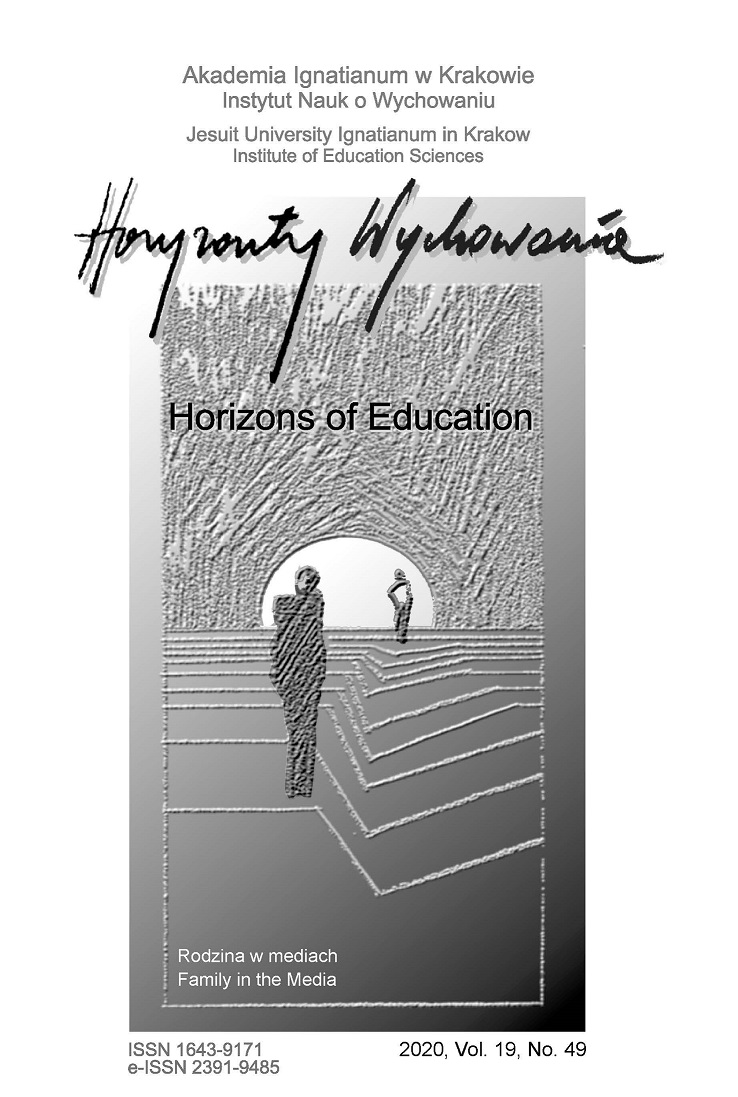Parenting blogs as a platform for the (self-) presentation of a modern Polish family
Abstract
ABSTRACT
SCIENTIFIC OBJECTIVE: The paper aims to present the results of the parenting blogosphere analysis focusing on the ways of presenting a modern Polish family.
RESEARCH PROBLEM and METHODS: The research problem was constructed as questions about the characteristics of the Polish parenting blogosphere, profiles of parenting blog authors, the scope and motivation to create content which is a source of information about the family. In the empirical part of the study, qualitative methods, netnography, content analysis and auxiliary quantitative research on statistical data were used.
PROCESS OF THE ARGUMENT: The first part of the paper explains the legitimacy of using selected research methods and presents the process of selecting the research sample. Secondly, it describes the specificity of the Polish family. Then, the article presents the characteristics of parenting blogs and their authors. Finally, the most prevalent models of the Polish family presented by bloggers are identified.
RESULTS OF THE SCIENTIFIC ANALYSIS: The results of the analyses show that the topic of family is usually perceived through one’s own experiences. The blogs included in the analysis do not describe family problems in a general context but rather they are focused on the roles of mothers, fathers or relationship with children. The family is often seen as a collection of individual problems of related people.
CONCLUSIONS, INNOVATIONS, RECOMMENDATIONS: The family, from the bloggers’ perspective, is very diverse and it depends on many factors (trends, socio-economic situation or culture). The uncertainty associated with the social and environmental acceptance of new family models is becoming increasingly common. Therefore, this study opens a discussion on the changing image of the family presented in social media. The topic seems important in the absence of comprehensive research on the parenting blogosphere in Poland.
References
Blood, R. (2002). The Weblog Handbook: Practical Advice on Creating and Maintainig Your Blog. Cambridge: Perceus Publishing, 6.
CBOS (2019). Korzystanie i internetu, Komunikat z badań, 95/2019. Warszawa, 13–14.
Cichocki, P., Jędrkiewicz, T. i Zydel, R., (2012). Etnografia wirtualna. W: D. Jemielniak (red.), Badania jakościowe. Metody i narzędzia. Warszawa: PWN.
JasonHunt Studio, Ranking najbardziej wpływowych blogerów 2018,
http://jasonhunt.pl/ranking-najbardziej-wplywowych-blogerow-2018/(dostęp: 25.11.2019).
Eccleston, D. i Griseri, L. (2008). How Does Web 2.0 Stretch Traditional Influencing Patterns? International Journal of Market Research: Web 2.0 special issue, 50(5).
Gregor, B., Kaczorowska-Spychalska, D., (2016). Blogi w procesie komunikacji marketingowej, Łódź: Wydawnictwo Uniwersytetu Łódzkiego, 49.
http://bielskiemamy.pl/blog-parentingowy-co-to-znaczy-i-ktory-jest-najlepszy/(dostęp: 23.11.2019)
https://madrzy-rodzice.pl/2017/10/50-najwiekszych-polskich-blogow-rodzicielskich-ranking/(dostęp: 23.11.2019)
https://socialmedia.pl/najlepsze-blogi-parentingowe/ (dostęp: 23.11.2019)
https://www.szczesliva.pl/ranking-blogow-parentingowych-grudzien-2016/(dostęp: 23.11.2019)
https://www.szymonslowik.pl/najlepsze-blogi-parentingowe/(dostęp: 23.11.2019).
Kawalec, B., Kim jest Influencer? Po zasięgach i charyzmie ich poznacie,
https://www.whitepress.pl/baza-wiedzy/275/kim-jest-influencer-po-zasiegach-i-charyzmie-ich-poznacie (dostęp: 07.12.2019).
Lejeune, P. (2010). „Drogi zeszycie…”, „drogi ekranie …”. O dziennikach osobistych, przekł. A. Karpowicz, M. i P. Rodakowie. Warszawa: Wydawnictwo Uniwersytetu Warszawskiego.
Li, Ch., Bernoff, J. (2009). Marketing technologii społecznych. Warszawa: MT Biznes.
Ludkowski, Ł. (2012). Social media po polsku. W: K. Budek (red.), Raport Social Media w biznesie. Raport Internet Standard 2/2012, Warszawa, 13.
Mariański, J. (2012). Małżeństwo i rodzina w świadomości młodzieży maturalnej – stabilność i zmiana. Toruń: Wydawnictwo Adam Marszałek.
mk, 30 lat temu zrobiono Polakom sondaż wartości. Dziś go powtórzyliśmy. Co się zmieniło?, http://wiadomosci.gazeta.pl/wiadomosci/7,114883,24841416,jak-zmienilismy-sie-w-ciagu-30-lat-od-pracy-i-religii-wazniejsi.html (dostęp: 28.11.2019)
Rokicki, L. (2013). Parenting, parentingowy, http://lukaszrokicki.pl/2013/06/15/parenting-parentingowy/ (dostęp:25.11.2019).
Sarowski, Ł. (2017). Od Internetu Web 1.0 do Internetu Web 4.0 – ewolucja form przestrzeni komunikacyjnych w globalnej sieci. Rozprawy Społeczne, t. 11, 32–39.
Silverstein, L., Auerach, C. (2005). (Post)modern families. W: J.L. Roopnarine, U.P. Gielen (red.), Families in Global Perspective. Boston: Person Education.
tw, Platformy blogowe: na czele Blogspot, mocno w dół Wordpress i Blox.pl, Tumblr.com przyciąga najdłużej, https://www.wirtualnemedia.pl/artykul/platformy-blogowe-na-czele-blogspot-mocno-w-dol-wordpress-i-blox-pl-tumblr-com-przyciaga-najdluzej (dostęp:29.11.2019).
Wilkowski, M. (2010). Warsztat: blogi naukowe dla opornych. Historia i media, http://historiaimedia.org/2010/05/04/warsztat-blogi-naukowe-dla-opornych/ (dostęp: 25.11.2019).
Copyright (c) 2020 Małgorzata Łosiewicz

This work is licensed under a Creative Commons Attribution-NoDerivatives 4.0 International License.
Authors who publish with this journal agree to the following terms:
- Authors retain copyright and grant the journal right of first publication with the work simultaneously licensed under a CC BY-NC-ND licence that allows others to share the work with an acknowledgement of the work's authorship and initial publication in this journal.
- Authors are asked to enter into separate, additional contractual arrangements for the non-exclusive distribution of the journal's published version of the work (e.g., post it to an institutional repository or publish it in a book), with an acknowledgement of its initial publication in this journal.
Authors are permitted and encouraged to post their work online (e.g., in institutional repositories or on their website) prior to and during the submission process, as it can lead to productive exchanges, as well as earlier and greater citation of published work (See The Effect of Open Access). We advise to use any of the following reserach society portals:





